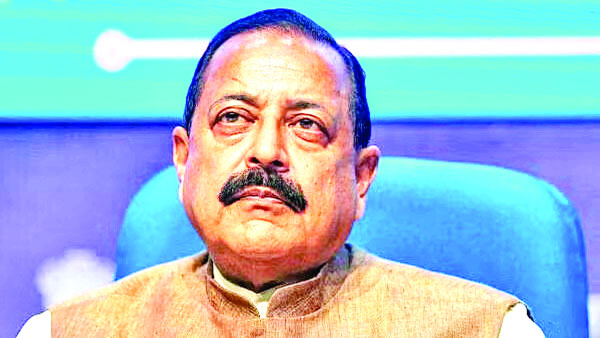DOGRA HERALD BUREAU
NEW DELHI, Nov 25
Union Minister of State (Independent Charge) for Science and Technology; Earth Sciences and Minister of State for PMO, Department of Atomic Energy, Department of Space, Personnel, Public Grievances and Pensions, Dr. Jitendra Singh convened a meeting of State GAD/ Personnel Secretaries to receive an update about the status of General Administration Department working in individual States and UTs as well as to familiarise them with new initiatives undertaken by the Central Government headed by Prime Minister Narendra Modi.
The Union Minister Incharge DoPT Dr Jitendra Singh shared a futuristic vision in governance driven by latest technology and motivated by the goal of Viksit Bharat 2047.
The meeting served as a platform for fostering knowledge exchange and collaboration among administrative leaders, with a focus on capacity building, technological integration, and reforms to enhance governance. The conference saw participation from almost all the States and Union Territories.
Addressing the participants, Dr. Jitendra Singh underscored the critical need for regular interactions to empower civil servants in meeting the evolving challenges of governance. He reaffirmed the government’s commitment to transparency, integrity, accountability, and efficiency, as reflected in initiatives like Mission Karmayogi, which has institutionalized capacity building for civil servants at all levels.
Highlighting the importance of grievance redressal mechanisms, the Minister noted that the centralized system has witnessed an unprecedented increase in public trust, with complaints handled annually growing from 2 lakh in 2014 to over 25 lakh in 2024. This surge demonstrates the government’s ability to address citizens’ concerns more effectively and in a timely manner.
During the meeting, Union Minister Dr. Jitendra Singh addressed several concerns raised by Principal Secretaries regarding administrative challenges and the development of civil servants. One key suggestion was the creation of a mentoring framework where senior officers could guide younger batches, helping them benefit from the knowledge and experience of their seniors. The Minister acknowledged this proposal and highlighted the importance of mentorship in shaping future leaders within the civil service.
Dr Jitendra Singh shared that the Department of Personnel and Training (DoPT) had already initiated a mentorship program in 2016, where officers undergo a three-month exposure to central government priorities, gaining a better understanding of national-level governance. This initiative has proven effective in boosting the confidence and initiative of younger officers, enabling them to interact with senior mentors and learn key aspects of governance practices.
In response to concerns about the lack of exposure for officers at the Deputy Secretary and Joint Secretary levels, Dr. Jitendra Singh emphasized ongoing efforts to address this gap. He highlighted initiatives like the National Learning Week and Mission Karmayogi, which now cater to various levels of civil servants, including those in state administrations. These programs are designed to equip officers with the necessary skills to navigate dynamic governance challenges.
Dr. Jitendra Singh also appreciated the development of online knowledge series aimed at providing essential information to officers and assured that the DoPT would collaborate with states to share best practices and resources, further enhancing the learning environment for civil servants nationwide.
The conference explored several key topics vital to governance and administrative reforms, with a focus on the increasing role of technology in administration. A major highlight was the implementation of centralized grievance mechanisms, which have greatly enhanced public trust in the system’s responsiveness. The discussions showcased success stories, such as the integration of face recognition technology and year-long capacity-building initiatives, both of which are helping civil servants adapt quickly to evolving governance needs. These reforms, along with Mission Karmayogi’s institutionalized framework, are equipping officers with the necessary skills to tackle modern administrative challenges effectively.
Sessions at the conference aimed to provide civil servants with the tools needed for contemporary governance. The Department of Personnel and Training (DoPT) presented key personnel reforms, and a discussion on Mission Karmayogi illustrated its transformative impact on civil services. The event also highlighted the use of electronic Human Resource Management Systems (eHRMS) to streamline personnel management, alongside discussions on the successful implementation of the Right to Public Grievance Redressal Act, which has boosted public service accountability.
Additionally, the Department of Administrative Reforms and Public Grievances (DARPG) conducted a session on digitalization, centralized grievance redressal, and special campaigns, aiming to modernize administrative processes.
Dr. Jitendra Singh emphasized the need for states to adopt technologies like face recognition systems to improve administrative efficiency. He also stressed that the capacity-building measures under Mission Karmayogi would help civil servants navigate the complexities of modern governance.
The Minister also highlighted the 2018 amendments to the Prevention of Corruption Act, which introduced accountability for both bribe-givers and bribe-takers, fostering a more balanced and just approach to corruption. He further emphasized the need for regular exchanges of best practices among states to replicate successful governance models nationwide.
The conference, organized by DoPT, saw the participation of DoPT Secretary Tuhin Kanta Pandey, DARPG Secretary V. Srinivas, and senior officials from both departments, enriching discussions on governance reforms.
Dr. Jitendra Singh concluded by expressing confidence that these collaborative efforts would drive progress and empower civil servants for more effective public service delivery.



























